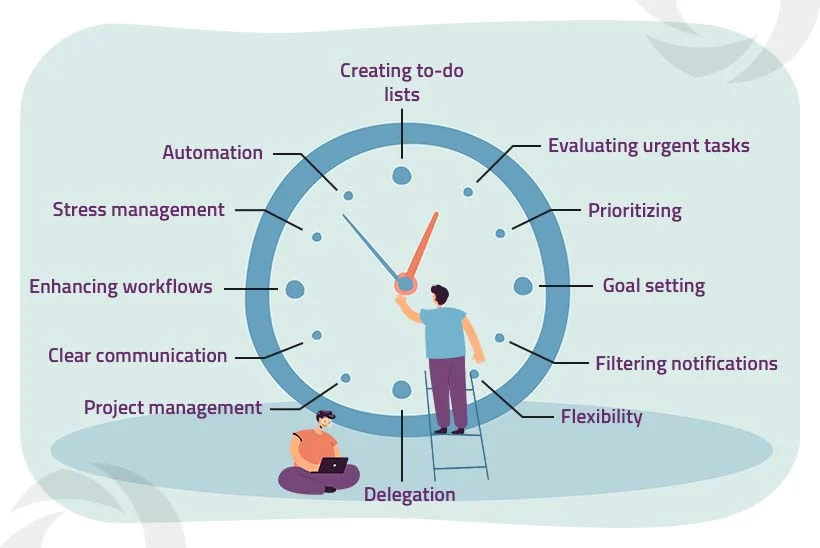We’ve all been there: sitting in front of a mountain of work, with a dozen different time management tips and productivity tools at our disposal, yet somehow still feeling overwhelmed. It’s easy to get distracted by the endless number of blogs, books, and apps promising to make you more productive, but the truth is, tools alone won’t solve the problem. There’s something deeper at play when it comes to managing your time effectively. You need to develop your time management skills in three key areas: awareness, arrangement, and adaptation. Let’s dive into how you can master each of these areas to truly transform the way you manage your time.
For those of you pursuing an online community college degree or juggling school, work, and personal life, building these skills is even more critical. It’s not just about knowing which app to use—it’s about knowing why and how to manage your time in a way that works for you, your lifestyle, and your goals.
Awareness: Understanding How You Spend Your Time
The first step in improving your time management is building awareness about how you currently spend your time. This is often the most overlooked part of time management advice. We tend to assume we’re busy or productive because we feel like we’ve been “doing something” all day. However, the truth is, we might be using our time inefficiently without even realizing it.
Start by tracking your time for a few days. Write down or use an app to log everything you do throughout the day—work tasks, study time, social media scrolling, meals, and even relaxation. This simple act of tracking is eye-opening. You’ll quickly spot patterns: Are you spending way more time on distractions than you thought? Are you neglecting important tasks because you’re spending too much time on low-priority ones?
Once you have a clearer understanding of where your time is going, you can make more intentional decisions about how to spend it. Awareness is about acknowledging your habits and gaining the clarity needed to adjust them. Without this awareness, any tool or strategy you try to implement won’t be as effective, because you won’t know where to focus your efforts.
Arrangement: Organizing Your Tasks and Priorities
Now that you understand where your time is going, it’s time to arrange it in a way that serves your goals. One of the most common mistakes in time management is trying to tackle everything at once. This can lead to burnout, frustration, and inefficient work. Instead, focus on organizing tasks based on their importance and urgency.
Use strategies like The Eisenhower Matrix to break tasks into four categories:
- Urgent and Important:
Tasks that need to be done immediately. These are the things you can’t put off.
- Not Urgent but Important:
Tasks that help you achieve your long-term goals. You don’t need to do them today, but you should schedule them soon.
- Urgent but Not Important:
Tasks that are time-sensitive but don’t move you closer to your big goals (like responding to non-critical emails).
- Not Urgent and Not Important:
Distractions and activities that waste your time.
By arranging your tasks this way, you can prioritize what truly matters and minimize time spent on low-impact activities. Whether you’re working on an online community college project or managing a busy work schedule, this method will help you stay focused on what will move you forward.
One of the most helpful tools for arrangement is a daily or weekly planner. Whether you prefer digital tools or physical planners, mapping out your day by assigning time blocks for each task can give you a visual sense of how your day should flow. Make sure to include buffer time for unexpected events or breaks. Overloading your schedule with tasks will only lead to stress and poor time management.
Adaptation: Adjusting When Things Don’t Go as Planned
Life has a funny way of throwing curveballs, doesn’t it? Even with the best planning, things don’t always go according to schedule. That’s why the third key area of time management is adaptation. No matter how organized you are, there will always be moments when tasks take longer than expected or you face interruptions that throw off your rhythm. The key is to adapt without losing your cool.
Start by building flexibility into your schedule. Instead of planning every single minute, leave room for unexpected tasks or delays. Life will throw things at you, but how you respond is what matters. If you can’t finish a task on a particular day, don’t beat yourself up. Reevaluate and adjust your schedule to accommodate the new timeline.
An important part of adaptation is learning from your mistakes. If a specific strategy or schedule didn’t work, don’t just discard it completely. Reflect on why it didn’t work and adjust it moving forward. For example, maybe you planned to study for three hours straight, but you found that you kept getting distracted after an hour. You can adapt by breaking study sessions into smaller chunks with breaks in between.
Adaptation also means adjusting based on what’s working. If you’re using a particular app or method and it’s making a significant difference in your productivity, lean into it. If something isn’t working—whether it’s a tool, method, or even a goal—be open to changing it. Time management isn’t a one-size-fits-all solution; it’s a personalized system that needs to be tweaked and adjusted over time.
Developing Consistency
In the end, the true key to improving your time management skills is consistency. Once you’ve built awareness, arranged your priorities, and learned to adapt to challenges, it’s time to make it a habit. This isn’t something you do once and forget about—it’s an ongoing practice. It’s easy to fall into old habits when things get busy, but if you commit to being intentional about how you spend your time, you’ll see real improvement.
Start small. Focus on one area at a time—whether it’s being more aware of how you use your time or better organizing your daily schedule. Over time, these small changes will become habits that make managing your time feel more natural.
Conclusion
Building time management skills isn’t about finding the perfect tool or trick—it’s about developing the right mindset and habits in three key areas: awareness, arrangement, and adaptation. By becoming aware of how you spend your time, arranging your tasks based on priority, and adapting when life throws you off track, you’ll have the foundation to manage your time effectively. Whether you’re working on an online community college degree, balancing work and personal life, or simply trying to stay productive, these skills will help you stay focused and make the most of your time. Remember, time management is a journey, and with practice, you’ll continue to improve every day.








